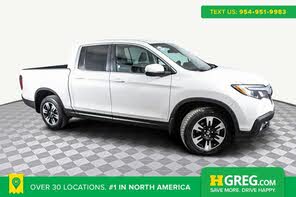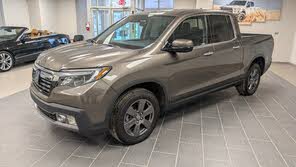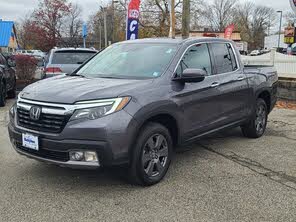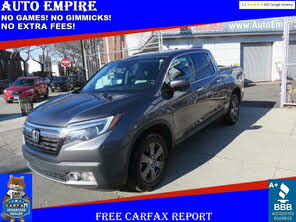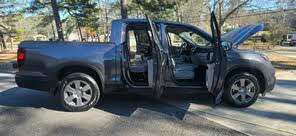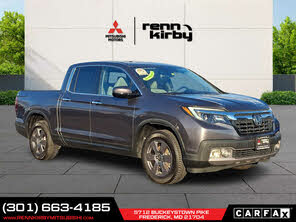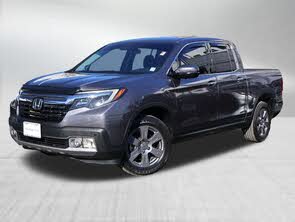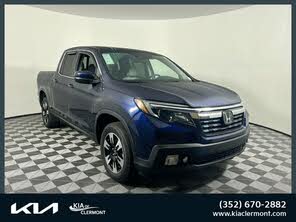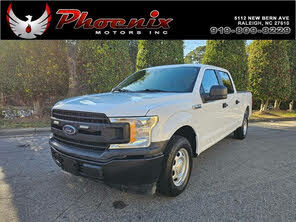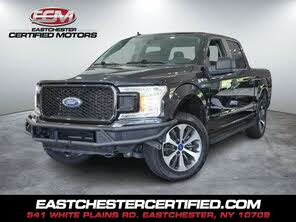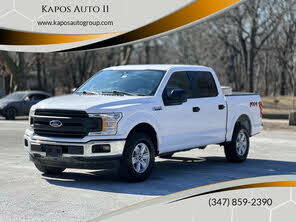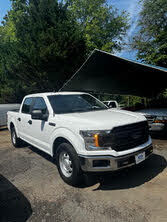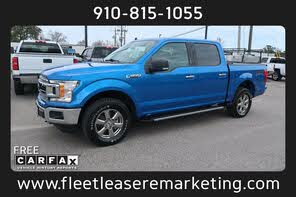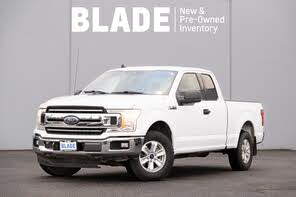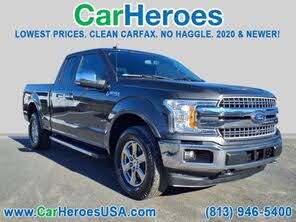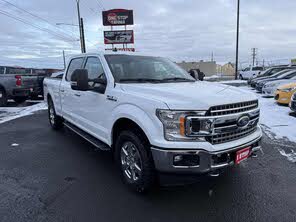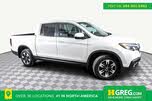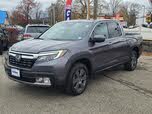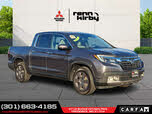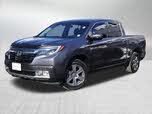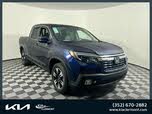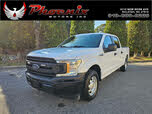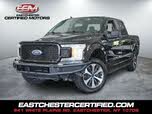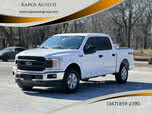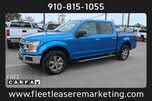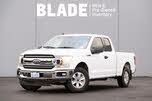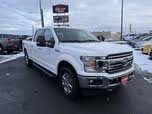2020 Honda Ridgeline vs 2020 Ford F-150
Overview | |
MSRP$28,745 | MSRP$33,900 |
Average price$31,281 | Average price$27,442 |
Listings4193 | Listings251 |
Ratings & Reviews | |
User Reviews | User Reviews |
Expert reviews8.3 out of 10 | Expert reviews7.3 out of 10 |
Pros
| Pros
|
2020 Ford F-150 Reviews SummaryThe modern pickup truck has to play the role of commuter car, grocery-getter, long-haul road tripper, and children's shuttle bus. And yet, these trucks still have to tow and haul whatever and whenever you need. The 2020 model year Ford F-150 answers that call by providing an accommodating and modern interior, comfortable road manners, and a lineup of engines that provide the power and torque to help it hold its own at the worksite. | |
2020 Honda Ridgeline Reviews SummaryBased on a platform and engineering also used for a minivan and crossover SUVs, the 2020 Honda Ridgeline isn’t your typical pickup truck. True, it does trade maximum towing capacity, payload ratings, and off-road capability for greater comfort and superior driving dynamics, but most of the time, that’s preferable. And because Honda bakes in numerous thoughtful details that make daily driving more pleasing, you might just decide that the Ridgeline offers the right recipe for your needs. | |
No video found | No video found |
Popular Features & Specs | |
Engine3.3L 290 hp V6 Flex Fuel Vehicle | Engine3.5L 280 hp V6 |
Drive Train4X2 | Drive TrainFWD |
Seating Capacity3 | Seating Capacity5 |
Horsepower | Horsepower280 hp @ 6000 rpm |
MPG City19 | MPG City19 |
MPG Highway25 | MPG Highway26 |
Engine | |
Engine Name3.3L 290 hp V6 Flex Fuel Vehicle | Engine Name3.5L 280 hp V6 |
Torque | Torque262 lb-ft @ 4700 rpm |
Horsepower | Horsepower280 hp @ 6000 rpm |
Drivetrain4X2 | DrivetrainFWD |
Fuel Economy | |
MPG City19 | MPG City19 |
MPG Highway25 | MPG Highway26 |
Interior | |
Seating Capacity3 | Seating Capacity5 |
Safety | |
Front Crash Overall4 | Front Crash Overall5 |
Side Crash Overall5 | Side Crash Overall5 |
Dimensions & Capacity | |
Bed Length78.9 in | Bed Length64.0 in |
Cargo Space12.1 cu ft | Cargo Space7.3 cu ft |
Curb Weight4069 lbs | Curb Weight4242 lbs |
Height75.5 in | Height70.2 in |
Length209.3 in | Length210.0 in |
Width96.8 in | Width78.6 in |
Wheelbase122.4 in | Wheelbase125.2 in |
Maximum Payload1990 lbs | Maximum Payload1465 lbs |
Number of doors2 | Number of doors4 |
Maximum Towing Capacity9200 lbs | Maximum Towing Capacity3500 lbs |
Standard Towing Capacity5100 lbs | Standard Towing Capacity3500 lbs |
Overview | ||
MSRP | $28,745 | $33,900 |
Average price | $31,281 | $27,442 |
Listings | ||
Ratings & Reviews | ||
User reviews | ||
Expert reviews | 8.3 out of 10Read full review | 7.3 out of 10Read full review |
Pros & cons | Pros
| Pros
|
Summary | The modern pickup truck has to play the role of commuter car, grocery-getter, long-haul road tripper, and children's shuttle bus. And yet, these trucks still have to tow and haul whatever and whenever you need. The 2020 model year Ford F-150 answers that call by providing an accommodating and modern interior, comfortable road manners, and a lineup of engines that provide the power and torque to help it hold its own at the worksite. | Based on a platform and engineering also used for a minivan and crossover SUVs, the 2020 Honda Ridgeline isn’t your typical pickup truck. True, it does trade maximum towing capacity, payload ratings, and off-road capability for greater comfort and superior driving dynamics, but most of the time, that’s preferable. And because Honda bakes in numerous thoughtful details that make daily driving more pleasing, you might just decide that the Ridgeline offers the right recipe for your needs. |
Video | No video found | No video found |
Popular Features & Specs | ||
Engine | 3.3L 290 hp V6 Flex Fuel Vehicle | 3.5L 280 hp V6 |
Drive Train | 4X2 | FWD |
Seating Capacity | 3 | 5 |
Horsepower | 280 hp @ 6000 rpm | |
MPG City | 19 | 19 |
MPG Highway | 25 | 26 |
Engine | ||
Engine Name | 3.3L 290 hp V6 Flex Fuel Vehicle | 3.5L 280 hp V6 |
Torque | 262 lb-ft @ 4700 rpm | |
Horsepower | 280 hp @ 6000 rpm | |
Drivetrain | 4X2 | FWD |
Fuel Economy | ||
MPG City | 19 | 19 |
MPG Highway | 25 | 26 |
Interior | ||
Seating Capacity | 3 | 5 |
Safety | ||
Front Crash Overall | 4 | 5 |
Side Crash Overall | 5 | 5 |
Dimensions & Capacity | ||
Bed Length | 78.9 in | 64.0 in |
Cargo Space | 12.1 cu ft | 7.3 cu ft |
Curb Weight | 4069 lbs | 4242 lbs |
Height | 75.5 in | 70.2 in |
Length | 209.3 in | 210.0 in |
Width | 96.8 in | 78.6 in |
Wheelbase | 122.4 in | 125.2 in |
Maximum Payload | 1990 lbs | 1465 lbs |
Number of doors | 2 | 4 |
Maximum Towing Capacity | 9200 lbs | 3500 lbs |
Standard Towing Capacity | 5100 lbs | 3500 lbs |
The 2020 Ford F-150 leaned more towards restraint in its design compared to other rivals like the Chevrolet Silverado 1500, which favored aggressive and abstract aesthetics. Ford designers opted for clean lines and a blocky grille that exuded confidence without appearing overly demanding. This timeless design was expected to age well, allowing this truck to still look appealing even when it changed hands to its third owner.
Inside, the F-150 featured a straightforward, mechanical-looking dashboard that could initially appear cold and unwelcoming. However, upon startup, the dash and infotainment screen came to life, providing a blend of form and function. Even lower-tier trims were designed to focus on durability with plenty of hard plastics, whereas upper-level trims added some soft-touch materials and leather, though it still fell short of the luxury level offered by rivals like the Ram 1500.
The trim levels ranged from the basic XL up to the luxuriously appointed Limited trim. For instance, the XL was a classic work truck with standard steel wheels, air conditioning, and manual locks. The XLT added features like cruise control, SYNC 3 infotainment, and a Wi-Fi hotspot. The Lariat bridged the gap between utility and luxury, offering leather-trimmed seats and advanced climate control. The King Ranch trim sported a unique Western vibe with saddle-leather upholstery, while the Platinum introduced massaging seats and unique chrome badging. For off-road enthusiasts, the Raptor featured specialized off-road running gear and a wider, more aggressive body design. The high-end Limited trim came with premium leather upholstery and a dual-panel moonroof, pushing the boundaries of truck comfort.
In contrast, the 2020 Honda Ridgeline, with its appearance, faced some criticism even from younger observers, resembling a minivan from the front and a pickup truck from the back. Its design seemed to lack the rugged and tough appearance traditional truck buyers expected. Although Honda made several updates this model year, including a new nine-speed automatic transmission and upgraded infotainment systems, the styling still didn't quite hit the mark.
Honda simplified the Ridgeline lineup to four trims: Sport, RTL, RTL-E, and Black Edition. Despite being more expensive, the base model came equipped with an 8.0-inch touchscreen display, Apple CarPlay, and Android Auto. The RTL-E trim tested offered perforated leather upholstery and gloss-black accents, adding to its refinement. However, the interior closely resembled that of the Honda Pilot, which might not appeal to those seeking a distinctive truck experience.
, the 2020 Ford F-150 offered a wide array of powertrains. The base XL and XLT trims came standard with a 3.3-liter V6 engine delivering 290 horsepower and 265 pound-feet of torque. Buyers could opt for more power with a 2.7-liter turbocharged EcoBoost V6, which produced 325 hp and 400 lb-ft of torque. A 5.0-liter V8 was also available, offering 395 hp and 400 lb-ft of torque.
For those seeking maximum power, the 3.5-liter EcoBoost V6 delivered an impressive 375 hp and 470 lb-ft of torque, leading the lineup. Additionally, a 3.0-liter turbodiesel V6 producing 250 hp and 440 lb-ft of torque was available for those who preferred diesel engines. Transmission options included a six-speed automatic for the XL and XLT trims, and a ten-speed automatic for the rest of the lineup.
The F-150 proved to be a formidable vehicle in terms of towing capacity, capable of towing up to 12,300 pounds when properly equipped. The vehicle's ride was surprisingly refined, with responsive steering and a manageable turning radius. The Raptor variant took performance to another level with its specialized off-road capabilities, including live valve technology in the suspension, a Terrain Management System, and enhanced skid plates for additional protection.
The 2020 Honda Ridgeline came with a strong 3.5-liter V6 engine generating 280 horsepower and 262 pound-feet of torque, paired with a nine-speed automatic transmission this year. Although this ZF-sourced transmission underwent continuous improvement over the years, it still displayed some quirks, such as allowing the truck to roll a bit after selecting Park.
The Ridgeline featured electronic transmission controls, which might have irked traditional truck buyers. Despite these quirks, the Ridgeline showcased Honda’s technological advancements like Intelligent Variable Torque Management all-wheel drive (i-VTM4), which improved its off-road capability. This system could distribute engine power efficiently, making the Ridgeline enjoyable to drive. With ground clearance reaching up to 7.9 inches, the Ridgeline tackled various terrains competently.
It also boasted Eco, Normal, and Sport drivetrain modes, along with Intelligent Traction Management systems for Snow, Mud, and Sand. Off-road performance was better than one might expect, but it still lagged behind dedicated off-road trucks like the Chevrolet Colorado ZR2 or Toyota Tacoma TRD Pro. On pavement, however, the Ridgeline shone brightly due to its independent rear suspension, offering a smooth and comfortable ride without compromising utility.
The 2020 Ford F-150 catered to various needs with its three cab sizes and three bed sizes. Cab options included Regular Cab, SuperCab, and SuperCrew, with bed sizes measuring 5.5, 6.5, and 8 feet. The Regular Cab offered a traditional single cab experience, while the SuperCab featured rear half-doors that could become a nuisance if the rear seats were frequently accessed. The SuperCrew stood out with its ample cabin space and remarkable rear-seat legroom. The rear seats in the SuperCrew could be flipped up to create a large load floor.
The F-150 cabin provided numerous storage options, including deep in-door pockets and a large center console storage bin. For bed access, an integrated bed step extended from the tailgate, though it had more moving parts compared to GM's corner bed steps.
The 2020 Honda Ridgeline, derived from the Honda Pilot SUV, offered a different take on truck utility. It lacked a third-row seat and enclosed cargo area but featured a 33.9 cubic-foot cargo bed. The front seats were as comfortable as those in the Pilot, with most trims offering heated front seats and power adjustments for the driver.
In the rear, the seat was comfortable, albeit short on legroom, with soft-padded front seatbacks and air conditioning vents for added comfort. In-cab storage was generous, with plenty of compartments. The rear seat cushion could be flipped up for additional secure storage. The composite cargo bed included an innovative 7.3 cubic-foot in-bed trunk with a drain plug, useful as a cooler or for muddy items. The tailgate could drop traditionally or swing to the side, and the bed featured a 150-watt/400-watt power outlet and a truck-bed audio system.
In terms of payload and towing, the F-150 dominated with a maximum payload of approximately 3,270 pounds and a towing capacity of 12,300 pounds. The Ridgeline, while less capable as a hauler, offered practical features for everyday use with its 1,580-pound maximum payload and 5,000-pound towing capacity when equipped with all-wheel drive.
The base XL trim of the 2020 Ford F-150 offered a basic AM/FM radio with auxiliary input, but moving up to the XLT model introduced the SYNC 3 infotainment system. This system, housed in a user-friendly 8-inch touchscreen, included Apple CarPlay, Android Auto, enhanced voice recognition, and smart-charging USB ports. FordPass, available starting from the XLT trim, enabled remote start, vehicle status checks, and even scheduling remote starts via a mobile app.
Higher trims benefited from additional audio enhancements, with a Kicker subwoofer available for the XL and XLT, and a B&O sound system by Bang & Olufsen with ten speakers and a subwoofer on higher trims.
For the 2020 Honda Ridgeline, the Display Audio system with an 8.0-inch touchscreen became standard. However, the lack of physical knobs and buttons, coupled with slow and specific voice-recognition technology, resulted in a less user-friendly interface. Steering wheel controls for volume and tuning helped, but overall ease of use suffered.
Upgrading to RTL-E or Black Edition trims added SiriusXM, HD Radio, navigation, and an eight-speaker premium sound system. Despite these upgrades, users might still rely on Apple CarPlay and Android Auto for the best experience.
The 2020 Ford F-150 came packed with standard safety features such as front and side-impact airbags, curve control, and a tire-pressure monitoring system. Additional features included AdvanceTrac with Roll Stability Control, rain-sensing headlights, and the SOS post-crash alert system. Ford’s standard pre-collision assist with automatic emergency braking was available even on the base XL trim, with higher trims offering amenities like blind-spot warning, lane-departure warning, and adaptive cruise control.
The F-150 also introduced Pro Trailer Backup Assist, simplifying trailer maneuvering. In crash tests, the SuperCrew models received five stars from the National Highway Traffic Safety Administration (NHTSA) and top scores from the Insurance Institute for Highway Safety (IIHS).
The 2020 Honda Ridgeline enhanced its safety profile with the standard Honda Sensing suite of advanced driving assistance systems. This included adaptive cruise control, forward-collision warning, automatic emergency braking, lane-departure warning, and lane-keeping assist. Higher trims added automatic high-beam headlights, blind-spot warning, and rear cross-traffic warning.
Although some systems like lane-departure warning and forward-collision warning could be overly sensitive, having these features was better than not. The Ridgeline received top safety ratings from both the IIHS and NHTSA, with five-star ratings except for a four-star rollover resistance score.
CarGurus highlights

According to CarGurus experts, the overall rating for the 2020 Ford F-150 is 8.3 out of 10, while the 2020 Honda Ridgeline scores 7.3 out of 10. With its superior capabilities, broader range of trim options, and advanced technologies, the 2020 Ford F-150 edges out the competition. Therefore, if you're in the market for a versatile and capable pickup, the Ford F-150 would be the better choice based on these ratings.
Choose the 2020 Honda Ridgeline if:
- You prefer a comfortable, car-like ride that doesn't compromise utility.
- You want functional innovations like an in-bed trunk and dual-action tailgate.
- You seek a standard suite of safety and driver-assistance features without jumping to higher trims.
Choose the 2020 Ford F-150 if:
- You need a vehicle with superior towing and payload capabilities.
- You value a broad range of trim options to meet various needs, from basic work truck to luxurious daily driver.
- You prioritize advanced and user-friendly infotainment and driver assistance technologies.
CarGurus highlights

According to CarGurus experts, the overall rating for the 2020 Ford F-150 is 8.3 out of 10, while the 2020 Honda Ridgeline scores 7.3 out of 10. With its superior capabilities, broader range of trim options, and advanced technologies, the 2020 Ford F-150 edges out the competition. Therefore, if you're in the market for a versatile and capable pickup, the Ford F-150 would be the better choice based on these ratings.
Choose the 2020 Honda Ridgeline if:
Shop Now- You prefer a comfortable, car-like ride that doesn't compromise utility.
- You want functional innovations like an in-bed trunk and dual-action tailgate.
- You seek a standard suite of safety and driver-assistance features without jumping to higher trims.
Choose the 2020 Ford F-150 if:
Shop Now- You need a vehicle with superior towing and payload capabilities.
- You value a broad range of trim options to meet various needs, from basic work truck to luxurious daily driver.
- You prioritize advanced and user-friendly infotainment and driver assistance technologies.

By: CarGurus + AI
At CarGurus, our team of experienced automotive writers remain at the heart of our content operation, conducting hands-on car tests and writing insightful guides that are backed by years of industry experience. To complement this, we are harnessing AI to make our content offering more diverse and more helpful to shoppers than ever. To achieve this, our AI systems are based exclusively on CarGurus content, ratings and data, so that what we produce is both unique to CarGurus, and uniquely helpful to car shoppers.





